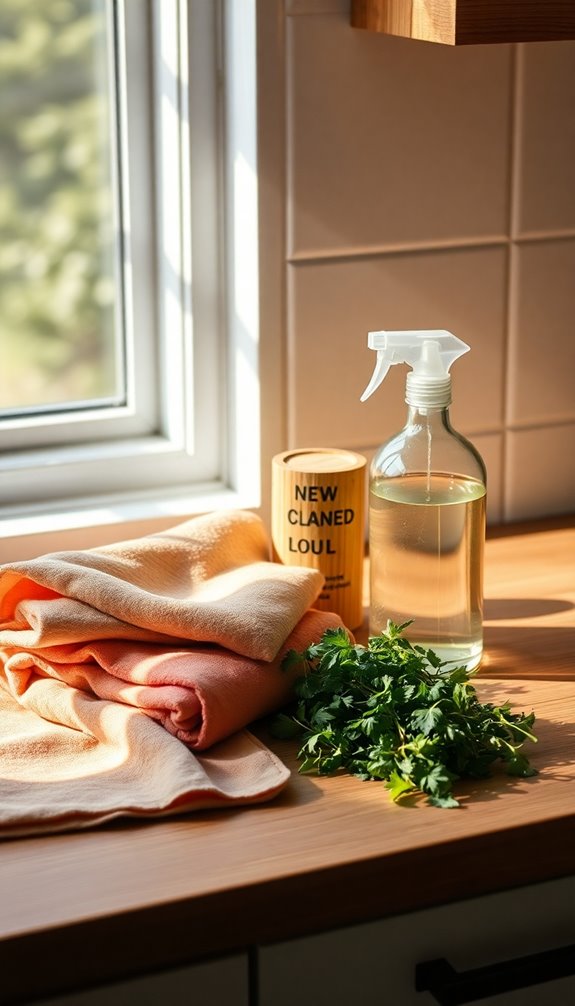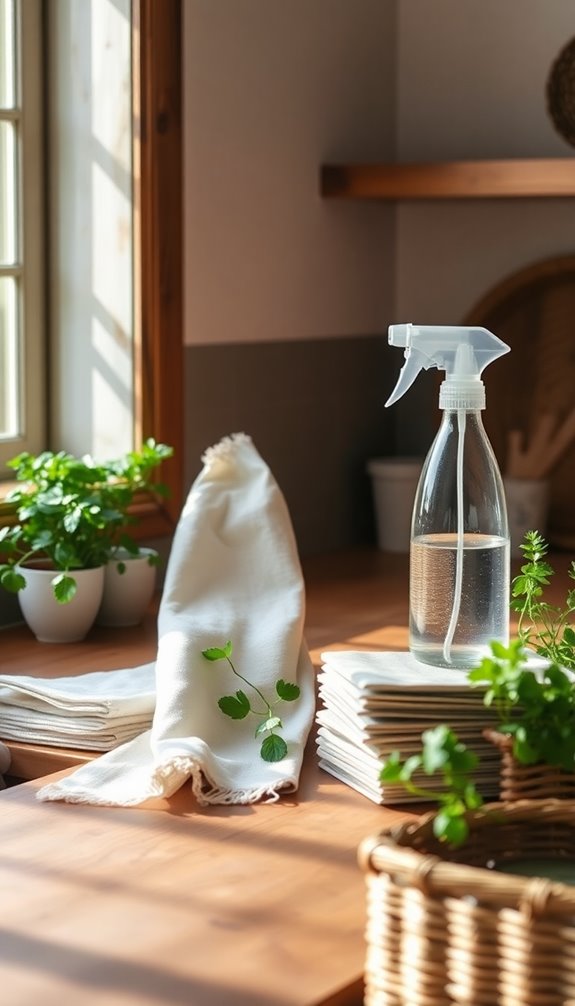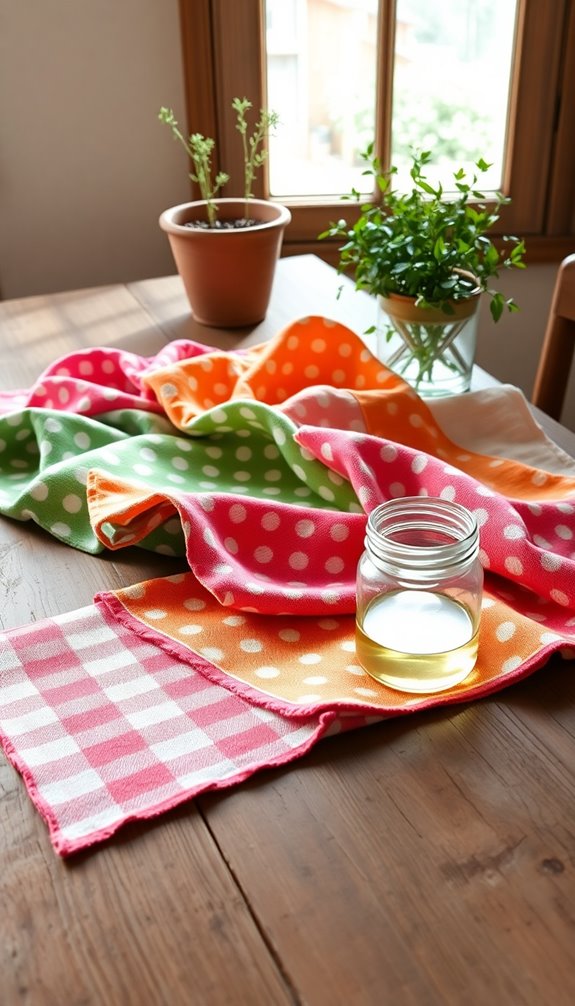If you're looking for sustainable paper towel alternatives, there are plenty of eco-friendly options to choose from. Consider bamboo paper towels, which are biodegradable and strong. Swedish dishcloths absorb more than their weight in liquid and can replace multiple rolls of paper towels. Reusable cloths like flannel or microfiber are highly durable and save money in the long run. Each option helps reduce waste considerably, making your home more sustainable. By switching just a few products, you can lower your impact on the environment. Discover even more choices to make your home greener and cleaner.
Overview of Eco-Friendly Options
In recent years, more people have turned to eco-friendly options for cleaning and drying, and for good reason. Traditional paper towels contribute greatly to environmental waste, but alternatives like bamboo paper towels and Swedish dishcloths provide sustainable solutions.
Bamboo paper towels aren't only strong and absorbent, but they're also biodegradable, supporting reforestation efforts. With a starting price of $49.99 for packs, they offer long-term savings compared to conventional brands. Additionally, regular use of natural cleaning methods can help you maintain your kitchen appliances without harsh chemicals. Using eco-friendly cleaning solutions can enhance the effectiveness of these bamboo towels, ensuring a cleaner environment.
Swedish dishcloths, made from cellulose and cotton, are another fantastic eco-friendly option. They can absorb up to 20 times their weight in liquid and replace up to 17 rolls of paper towels, making them incredibly efficient.
When you choose reusable cloth options, like flannel or huck towels, you're actively lowering waste and contributing to sustainable living. Additionally, using eco-friendly cleaners can further enhance your commitment to a greener home.
Types of Sustainable Alternatives
Exploring the types of sustainable alternatives available can help you make informed choices for your cleaning needs. One great option is recycled paper towels, which are made from post-consumer waste, conserving natural resources while reducing the reliance on virgin wood fibers.
If you're looking for something even more eco-friendly, consider bamboo paper towels; they're biodegradable and decompose in about 90 days. To maintain a cleaner environment, it's also beneficial to incorporate effective dusting techniques that help trap allergens and dust. Additionally, using green cleaning products can further enhance the sustainability of your cleaning routine.
Another excellent choice is Swedish dishcloths, which can absorb up to 20 times their weight in liquid and replace up to 17 rolls of conventional paper towels. They're efficient and versatile, making them a must-have in any eco-conscious home.
Additionally, flannel cloths offer a highly absorbent and reusable option, lasting through hundreds of washes, while microfiber cloths attract and trap dirt effectively, reducing the need for excessive cleaning products and water. Incorporating these options supports eco-friendly cleaning practices that minimize environmental impact while maintaining a clean home.
Environmental Impact of Paper Towels

When you reach for a traditional paper towel, you're contributing to serious environmental issues like deforestation and resource depletion.
The production process not only consumes vast amounts of water but also pollutes waterways, harming aquatic life. Additionally, the use of single-use items like paper towels contributes to water pollution by increasing the demand for disposable products that ultimately end up in our ecosystems. Eco-friendly alternatives, such as natural cleaning solutions, can significantly reduce our reliance on single-use products and their associated environmental impacts. Furthermore, opting for sustainable cleaning tools can help minimize waste and promote a more eco-conscious lifestyle.
Plus, with single-use paper towels piling up in landfills, it's clear that these choices have a significant impact on our planet.
Deforestation and Resource Depletion
The production of paper towels cuts down trees at an alarming rate, directly contributing to deforestation and resource depletion. Each year, around 51,000 trees are felled just for paper towels, leading to habitat loss for countless species.
This rapid deforestation disrupts ecosystems and diminishes biodiversity, which is essential for maintaining the balance of our environment.
Additionally, producing one roll of traditional paper towels requires about 2.5 gallons of water, considerably depleting water resources. As you consider alternatives, think about the sustainable options available. By switching to reusable alternatives, like Swedish dishcloths, you can save approximately 17 rolls of paper towels for every cloth used. This change not only reduces your consumption of paper products but also offers considerable environmental benefits.
Furthermore, with an estimated 3,000 tons of paper towel waste ending up in landfills daily, the impact on our planet becomes even more concerning.
Pollution From Production Process
While considering the impact of paper towels on deforestation and resource depletion, it's important to recognize how their production process also contributes to pollution. The manufacturing methods involved in creating traditional paper towels not only deplete forests but also harm our environment in various other ways.
- Each ton of paper produced results in about 17 trees cut down, exacerbating deforestation.
- Producing a single roll requires approximately 2.5 gallons of water, putting strain on already limited water resources.
- The chemical bleaching processes introduce pollutants into waterways, harming aquatic ecosystems and drinking water supplies.
Moreover, with around 3,000 tons of paper towels discarded annually in the U.S., you're looking at significant landfill waste.
These towels typically aren't recyclable due to their absorbent and contaminated nature. As they decompose, they contribute to greenhouse gas emissions, further amplifying their environmental footprint.
Single-Use Waste Accumulation
Every year, millions of paper towels are used and tossed aside, creating a staggering amount of single-use waste that contributes to environmental degradation. In the U.S. alone, about 3,000 tons of traditional paper towels end up in landfills annually due to their single-use design. This isn't just waste—it's a significant burden on our environment.
For every ton of paper produced, around 17 trees are cut down, leading to habitat loss and declining biodiversity.
Moreover, the production of traditional paper towels requires approximately 2.5 gallons of water per roll, placing further strain on our precious resources. The chemical processes involved in making these towels can pollute waterways, harming aquatic ecosystems.
With such alarming landfill contributions from disposable paper products, it's clear that we need to rethink our choices.
Switching to reusable towels can drastically cut down on single-use waste accumulation and prevent thousands of gallons of water from being wasted each year. By making this simple change, you'll not only reduce your environmental footprint but also help combat the ongoing issues of deforestation and pollution.
Benefits of Bamboo Paper Towels
When you choose bamboo paper towels, you're making a smart, eco-friendly choice that benefits the planet. These towels not only come from a rapidly renewable resource, but they also help reduce landfill waste considerably. Plus, their competitive pricing means you'll save money in the long run compared to buying traditional options. Additionally, bamboo's ability to reduce water consumption during its growth process highlights its role in promoting sustainability.
Environmental Sustainability Benefits
Bamboo paper towels stand out as a sustainable choice for eco-conscious consumers, thanks to their impressive environmental benefits. Made from a rapidly renewable resource, bamboo grows up to 3 feet per day, greatly reducing the strain on forests. By choosing bamboo paper towels, you help promote sustainable harvesting practices while enjoying their eco-friendly features.
Here are some key environmental sustainability benefits:
- Biodegradable and Compostable: Bamboo paper towels break down naturally, reducing landfill waste compared to traditional paper towels.
- Less Resource Intensive: They require less water and energy to produce than conventional options, minimizing your carbon footprint during the manufacturing process.
- Chemical-Free Production: Bamboo paper towels are made without harmful bleaching agents, protecting waterways from pollution.
Using bamboo paper towels can replace up to 130 rolls of disposable paper towels, leading to considerable reductions in both usage and waste.
By making this simple switch, you're not just opting for a product; you're contributing to a healthier planet and embracing environmental sustainability in your daily life.
You'll feel good knowing your choice is a step towards a greener future.
Cost-Effective Long-Term Savings
Switching to bamboo paper towels can lead to considerable long-term savings for your household. By replacing approximately 50 rolls of traditional disposable paper towels, you can greatly cut down on your household expenses. Priced around $49.99 for a pack, bamboo paper towels are a cost-effective investment compared to conventional brands.
You could save an estimated $240 to $360 annually just by making the switch. Not only does this mean more money in your pocket, but it also supports sustainable practices that reduce landfill waste.
Bamboo's biodegradability and compostability contribute to lower disposal costs over time, which can add even more to your long-term savings.
Moreover, as you adopt bamboo paper towels, you're helping to decrease the environmental impact associated with disposable paper towels. This can lead to reduced cleanup costs associated with environmental damage in the future.
Consumer Trends in Sustainability

In recent years, consumers have increasingly prioritized sustainability in their purchasing decisions. According to a 2021 survey, 73% of you're now focusing on eco-friendly options, with social media playing an essential role in shaping these consumer habits.
Over 60% of you reported seeking out sustainable products after seeing them promoted online.
A notable shift in preferences is evident in the growing demand for bamboo and recycled paper products, leading to a 30% increase in sales over the past two years. This trend reflects a heightened environmental awareness among consumers.
You're also willing to pay a premium for sustainable products, with 66% indicating that commitment to positive environmental practices influences your choices.
Here are some key trends driving this shift:
- Increased interest in reusable cleaning options, such as cloths and Swedish dishcloths.
- A significant number of households (50%) have reduced traditional paper towel use.
- A growing array of brands offering eco-friendly alternatives.
As you navigate the market, your choices are shaping a more sustainable future, contributing to a collective movement towards a greener planet.
Comparing Eco-Friendly Alternatives
When exploring eco-friendly alternatives to traditional paper towels, you'll find a variety of options that cater to different cleaning needs while supporting sustainability.
Reusable cloths like flannel and Swedish dishcloths stand out for their effectiveness; a single Swedish dishcloth can replace up to 15 rolls of paper towels. If you're looking for something more absorbent, microfiber cloths absorb up to seven times their weight in water, making them perfect for various cleaning tasks.
Bamboo paper towels provide a sustainable alternative as well. While they're priced around $49.99 for packs, they're biodegradable and support reforestation efforts.
For heavy-duty messes, consider Huck towels; originally designed for hospitals, they're durable, lint-free, and highly absorbent.
Although options like recycled paper towels are less sustainable than bamboo, they still contribute to eco-friendly practices by being made from repurposed materials, helping reduce landfill waste.
Each of these alternatives offers unique benefits, allowing you to choose what best fits your cleaning routine while making a positive impact on the environment.
Tips for Sustainable Transition

To make a sustainable shift, start small by swapping out one disposable product at a time.
As you build this new habit, track your progress and celebrate the positive changes you're making.
Don't forget to involve your family and friends, as their support can help create a bigger impact together.
Start Small, Build Habit
Making small changes can lead to big results in your journey toward sustainability. Begin by replacing one product at a time, like switching from traditional paper towels to reusable options such as Swedish dishcloths. These eco-friendly alternatives can replace up to 15 rolls of disposable towels each, saving you money and resources.
To build sustainable habits, consider these tips:
- Track your consumption: Visualizing your impact can motivate you, as using reusable towels can save an average household about $240 annually.
- Gradually reduce reliance: Keep a small supply of paper towels for particularly messy tasks. This way, you can adapt to using reusables without feeling overwhelmed.
- Educate yourself: Understanding the environmental benefits of reusables can inspire you. Shifting to these options can save thousands of gallons of water and reduce deforestation linked to paper towel production.
Involve Family and Friends
Involving family and friends in your journey toward sustainable living can amplify your impact and make the change more enjoyable. Start with an eco-challenge to reduce paper towel usage for a month. Track your collective waste reduction to see how much you can achieve together.
Share the benefits of switching to reusable alternatives, like the fact that one Swedish dishcloth can replace up to 17 rolls of paper towels, drastically cutting down on landfill contributions.
Consider hosting a DIY workshop where everyone can create personalized reusable cloths or learn easy sewing patterns for making unpaper towels. This fosters creativity while promoting sustainability.
You might also distribute information about the long-term cost savings associated with reusable products; after all, the average household spends $20-$30 monthly on disposable paper towels, which can be recouped in less than a year with reusables.
Encourage friendly competition by creating a family or friends' eco-challenge to find the most innovative eco-friendly alternatives. This not only raises awareness about sustainable living but also makes the shift fun and engaging for everyone involved.
Future Innovations in Paper Products
The future of paper products is poised for remarkable transformations, driven by a commitment to sustainability. You'll likely see innovations that enhance biodegradability and compostability, considerably reducing environmental impact. As consumer demand for transparency grows, brands will adopt eco-labeling practices, allowing you to easily identify truly eco-friendly products.
Key innovations to watch for include:
- Alternative fibers: Utilizing materials like agricultural waste and other plant-based sources to create sustainable paper, minimizing reliance on traditional trees.
- Circular economy principles: Closed-loop systems will continuously recycle and reprocess paper products, cutting down the need for virgin materials and promoting sustainability.
- Collaborations: Partnerships between brands and environmental organizations will lead to new certifications, guaranteeing that you can trust the sustainability claims of paper products.
These advancements will make it easier for you to choose products that align with your eco-friendly lifestyle.
The focus on biodegradable and sustainable options guarantees that paper products won't only meet your needs but also support a healthier planet. Keep an eye out for these exciting changes as they unfold!
Top Picks for Reusable Towels

As sustainable paper products evolve, many people are looking for practical alternatives to traditional paper towels. If you're in the market for reusable towels, here are some top picks that are both eco-friendly and highly absorbent.
First up are Utopia Towels Washcloths. This 60-pack option is versatile, measuring 10.75 x 11 inches, and perfect for various cleaning tasks. They're machine washable, making maintenance a breeze.
For budget-conscious shoppers, consider Aidea Reusable Cleaning Cloths. At about 16 cents each in an 80-pack, these thinner cloths still offer decent absorbency for everyday use.
If you want a premium choice, check out MioEco Reusable Paper Towels. Priced at $19.95, these soft towels can replace around 130 rolls of disposable options and are also machine washable.
Another colorful choice is Marleys Monsters UNpaper Towels. Although they may be less absorbent, their 12 vibrant designs make them a fun addition to your cleaning routine.
Lastly, Swedish Wholesale Swedish Dishcloths are biodegradable and can replace 15 disposable rolls, measuring 8 x 7 inches to tackle various surfaces effectively.
Less Favorable Alternatives to Consider
When exploring alternatives to traditional paper towels, some options may not meet your expectations for durability and effectiveness. While these eco-friendly choices aim to reduce waste, they can fall short in key areas like absorbency and usability.
Here are a few less favorable alternatives to take into account:
- Wowables Swedish Dishcloths: Priced at $22.88 for 30, they often lack absorbency and are discarded after a single use, undermining long-term sustainability.
- Juniper Seed Mercantile Organic Cotton Unpaper Towels: At $23.99 for 12, these towels are too nice for messy tasks, limiting their practicality in your household.
- If You Care Reusable Paper Towel Roll: Costing $8.88, these require hand washing, which makes them less convenient than machine-washable options and offer limited durability.
While some products may look appealing, their effectiveness can be disappointing.
To guarantee a sustainable choice, weigh the absorbency and practicality of these alternatives against your daily needs. Sometimes, investing in higher-quality, machine-washable options pays off in the long run, offering better durability and performance.
Conclusion
Switching to sustainable alternatives for paper towels isn't just a trend; it's a leap toward a greener future. By choosing options like bamboo or reusable towels, you're not only reducing waste but also making a positive impact on the planet. Remember, every small change adds up, like drops in a bucket filling up to create a mighty ocean of change. Embrace these eco-friendly choices today, and watch your home transform into a sanctuary of sustainability!